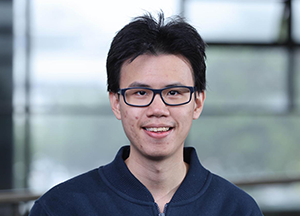
Kenneth Choo, Monash
Exciton polaritons are hybrid particles of excitons (bound electron-hole pairs) and cavity photons, which can display Bose-Einstein condensation and other coherent phenomena at elevated temperatures. However, their formation in semiconductor microcavities is often accompanied by the appearance of an incoherent bath of optically dark excitons that can interact with polaritons via their matter component.
Here, we show that the presence of such a dark excitonic medium can ‘dress’ polaritons with density fluctuations to form new polaron-like quasiparticles, thus fundamentally modifying their character. We employ a many-body Green’s function approach that naturally incorporates correlations beyond the standard mean-field theories applied to this system. With increasing exciton density, we find a reduction in the light-matter coupling that arises from the polaronic dressing cloud rather than any saturation induced by the fermionic constituents of the exciton.
In particular, we observe the strongest effects when the spin of the polaritons is opposite that of the excitonic medium. In this case, the coupling to light generates an additional quasiparticle – the biexciton polariton – which corresponds to the dark-exciton counterpart of a polariton Feshbach resonance. Our results can explain recent experiments on polariton interactions in two-dimensional semiconductors and potentially provide a route to tailoring the properties of exciton polaritons.
About the presenter
Kenneth is a PhD candidate in CI Meera Parish‘s group. His research aims to investigate the interactions between excitons (or exciton-polaritons), and 2-D electron gas, with a view to inducing a collective, dissipationless flow of charged bosons: exciton-mediated superconductivity.
